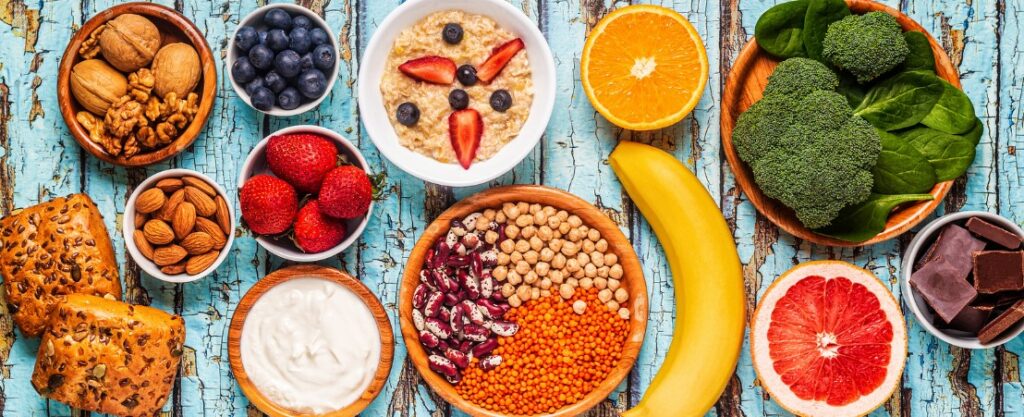5 Best Food Choices that Support Mental Health: Research found a strong link between our food choices and mental health. Thus, a healthy diet can improve symptoms of certain mental disorders, such as depression and anxiety, while an unhealthy diet can make them worse.
Below are the top 5 food choices to incorporate into a healthy mental diet.
The Link Between Food and Mental Health
The link between food intake and mental health stems from the close relationship between the brain and the gastrointestinal tract, often called the ‘second brain.‘
Here is how it works: The gastrointestinal tract (GI) is home to billions of bacteria that affect the production of chemical substances responsible for carrying messages from the gut to the brain. The two common examples are dopamine and serotonin.
Healthy food choices promote the growth of ‘good’ bacteria, which can help the production of these chemicals. When there is optimal production, the brain will receive messages loud and clear, along with improvement in your mental state.
On the other hand, when the production goes off, it can cause mood changes and affect your mental health.
Eating a healthy, balanced diet is the key to having fewer mood swings and an improved ability to focus. Numerous studies prove that a clean diet can help reduce symptoms of depression and anxiety. Whereas eating processed, unhealthy foods have been linked to an increased risk of stroke or dementia.
In addition to food choices, the act of eating itself can affect your mental health. Having meal times provide a sense of structure and socialization, which can help boost mental fitness.
Overall, it is important to pay attention to the quality of the food and how we consume it, as it can significantly impact our mental health and well-being.
5 Foods That Boost Mental Health
To balance your mental health, add these five food options to your next grocery list.
Whole foods
Whole foods are foods that are as close to their natural state as possible and are unprocessed and unrefined. These foods are often rich in nutrients and antioxidants that are beneficial for overall health and well-being and can play an important role in maintaining good mental health.
Whole foods are often high in fiber, which can help to regulate blood sugar levels, which can lead to feelings of fatigue, irritability, and anxiety. It is also rich in vitamins and minerals, such as vitamin C, vitamin K, and manganese, which are important for maintaining overall health.
In addition, studies have found that people who eat a diet high in whole foods are less likely to be deficient in these essential nutrients, which can improve mental well-being.
Fermented foods
Fermented foods have been through a process of fermentation, where natural bacteria and yeast break down the sugars and starches in the food, creating beneficial probiotics. Some staple fermented food found in our homes is kimchi, sauerkraut, and pickles.
The gut and brain are closely connected, which means a healthy gut can contribute to a healthy mind. Consuming fermented foods can help promote a healthy balance of gut bacteria, which improves the gut-brain axis and bring a positive impact on mental health.
Some studies show that consuming probiotics can help to reduce symptoms of depression and anxiety. In contrast, others have found that probiotics may improve cognitive function and memory.
Fiber-rich foods
Fiber up for mental health. Besides the physical benefits of a high-fiber diet, your mental health can also benefit from it.
Fiber is a type of carbohydrate that is found in plant-based foods such as fruits, vegetables, whole grains, and legumes. It is important for maintaining healthy digestion and regular bowel movements, but it also plays a role in mental health.
Eating a diet that is rich in fiber can have a number of potential benefits for mental health. It can help to regulate blood sugar levels, reduce inflammation, promote healthy gut bacteria, and promote feelings of fullness and satiety. It is a simple yet effective way to improve mental well-being and overall health.
Berries
Beat the blues with this blue food.
Berries have been shown to have several health benefits, including potential benefits for mental health. Studies have found that consuming berries may have anti-inflammatory and antioxidant effects, which may help to reduce the risk of cognitive decline and improve overall brain function.
Additionally, some types of berries, such as blueberries, have been shown to improve memory and cognitive function.
Blueberries contain compounds called anthocyanins, which have been found to positively affect memory and learning and may even help delay age-related cognitive decline. The compounds in berries such as raspberries, blackberries, and strawberries have also been found to have anti-inflammatory properties.
These compounds may help to reduce the risk of developing mental health conditions such as depression and anxiety.
Walnuts
Walnuts are a good source of nutrients that may benefit mental health. It is high in omega-3 fatty acids, which research suggests can help improve symptoms of conditions such as depression and anxiety.
Walnuts are also high in antioxidants, which help to protect the body’s cells from damage caused by free radicals. Some research suggests that antioxidants also have a protective effect on brain health.
In addition, walnuts are also a good source of other nutrients, including vitamins, minerals, and plant compounds that are important for overall health.
Dark Chocolate
Dark chocolate is considered to be good for mental health because it contains certain compounds that can have positive effects on the brain and the body. It is high in antioxidants called flavonoids, which have been linked to improved brain function and a reduced risk of cognitive decline.
When planning a healthy diet, it is important to understand how food choices affect your brain. Integrating ‘good’ foods into your diet will not help you achieve your target weight; it will also help improve your brain function.
Eating Well for Mental Health
The role of a healthy diet and nutrition on one’s mental health is very complex and goes beyond mood and general well-being.
Paying attention to the food we eat and how we eat it is one of the first steps to ensuring you are consuming the right food for your brain and body.
Since many people need to pay more attention to their eating habits, we recommend keeping a food and mental health journal. Documenting what you eat and how it affects your mood is a great way to gain insight into your patterns.
Learning mental health first aid (MHFA) is also a must to recognise and respond to signs of mental health and substance use disorders. MHFA can increase the chances of early intervention and recovery and improve overall mental health and well-being.
Learn more about mental health first aid here.







